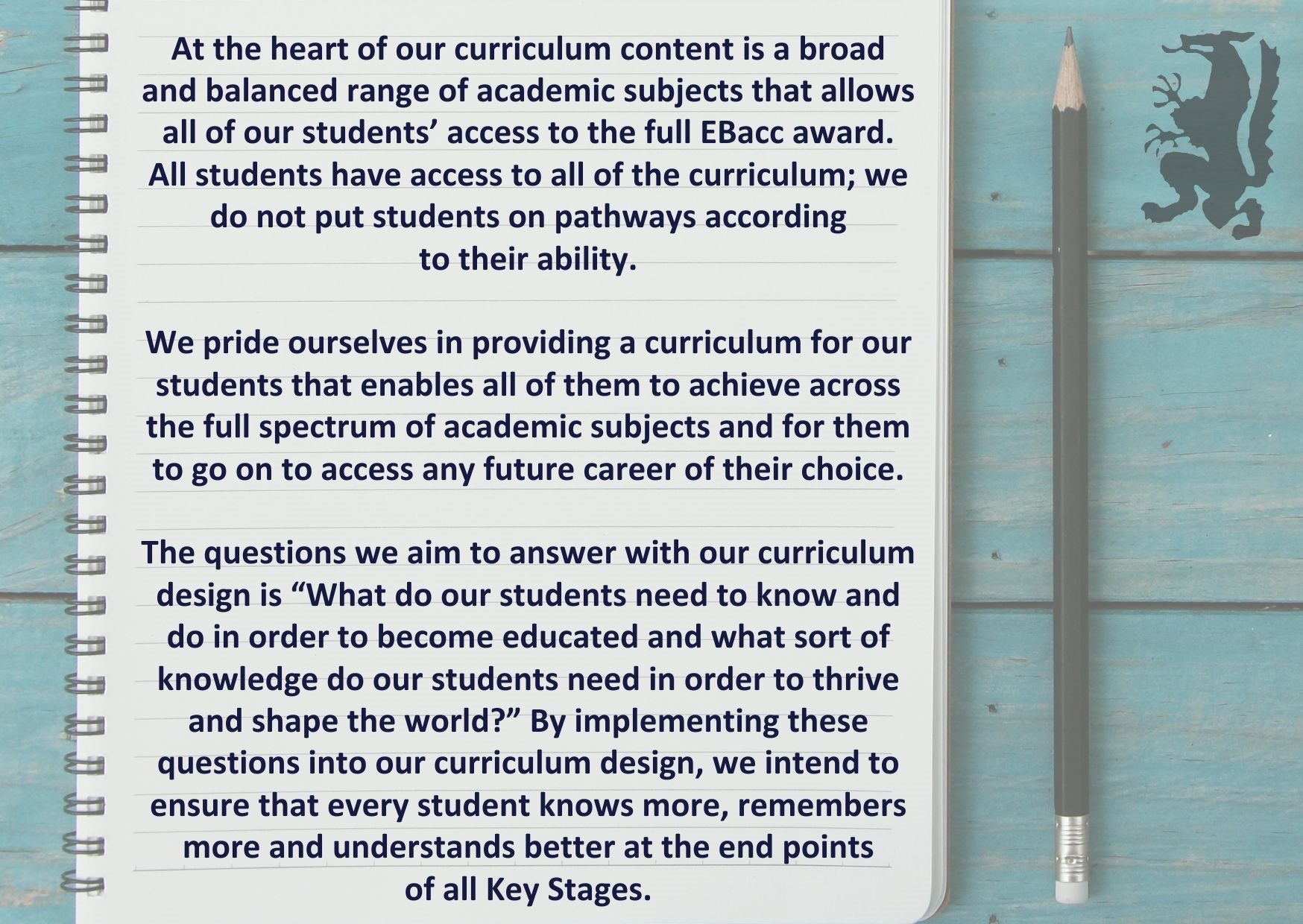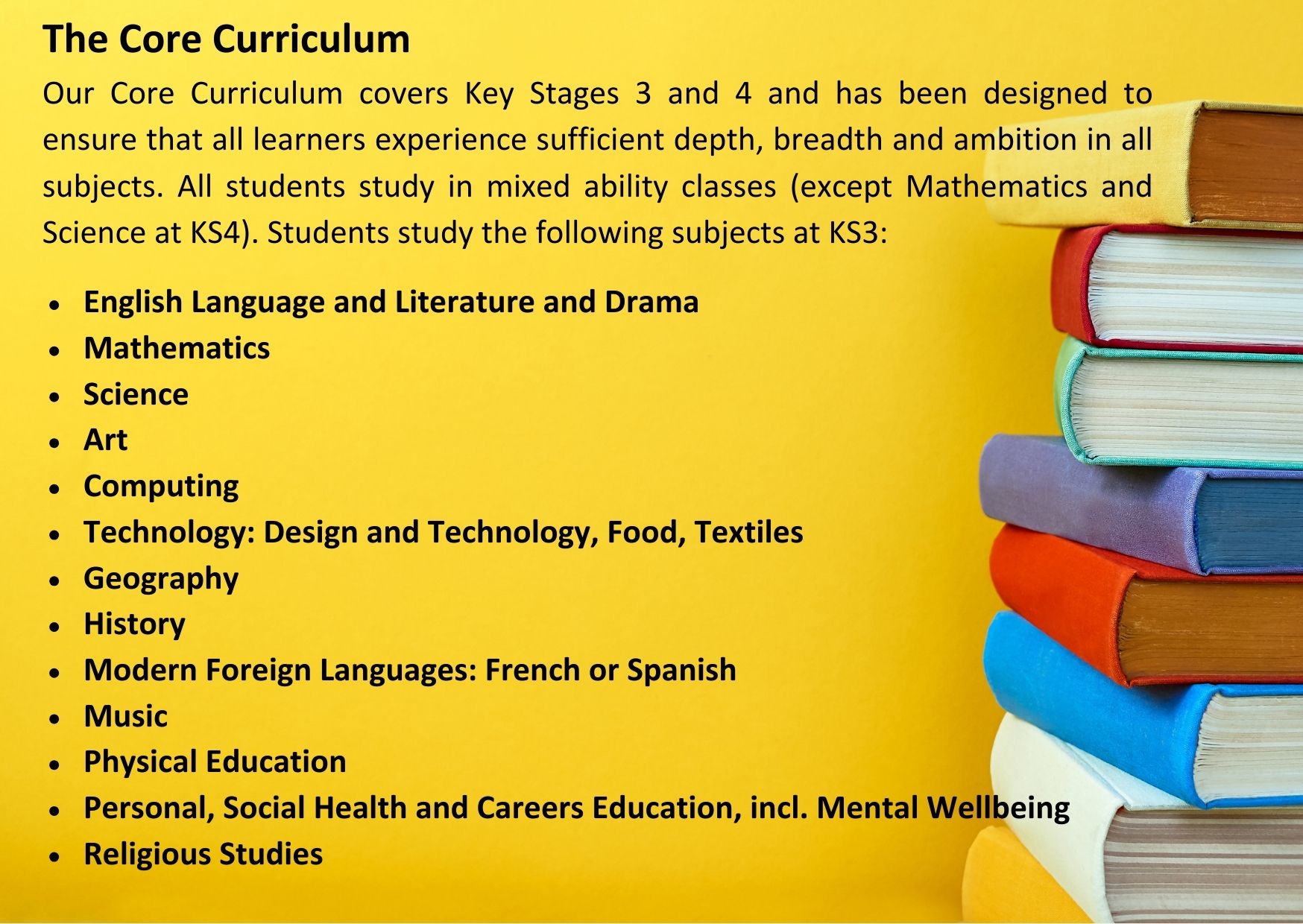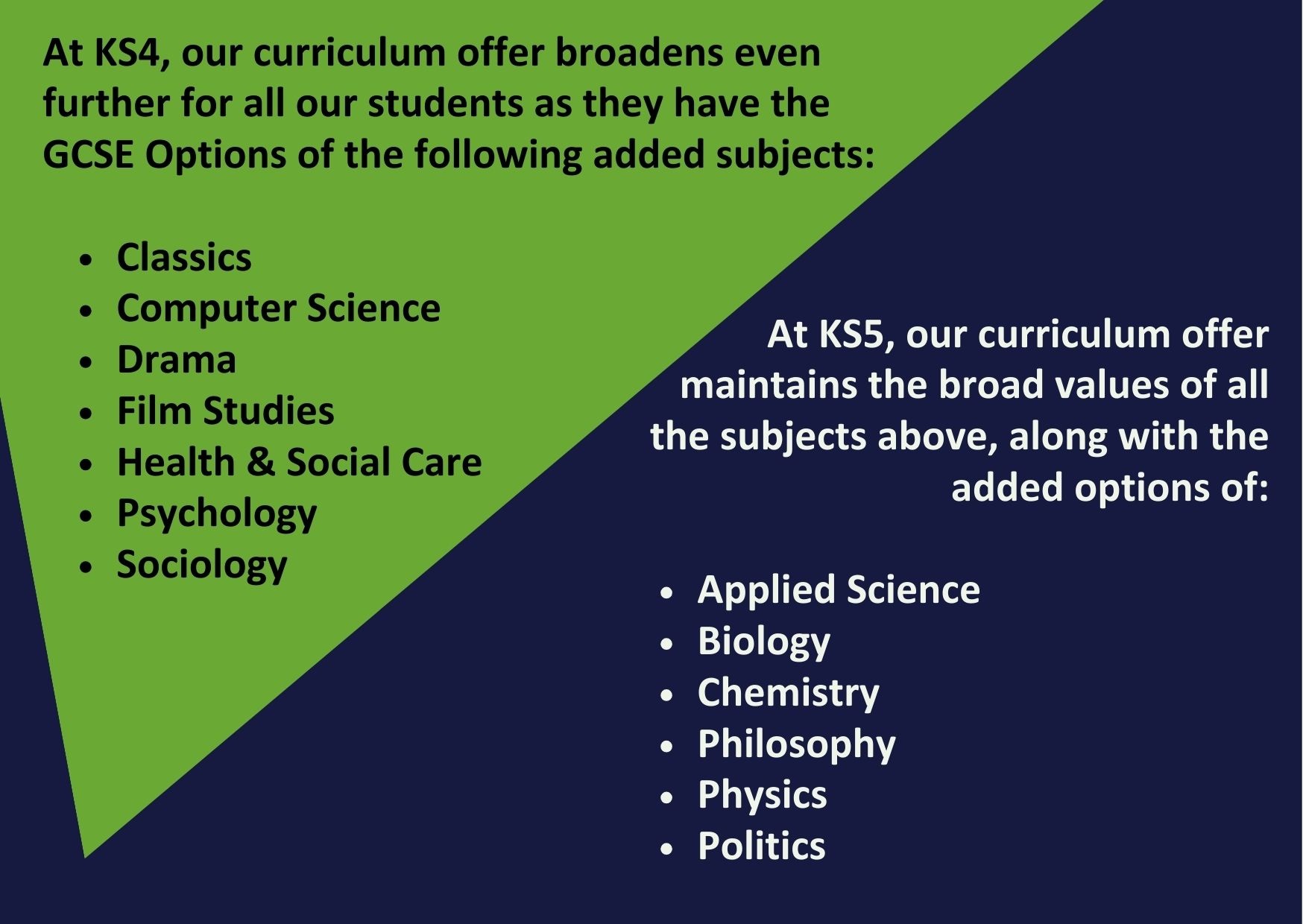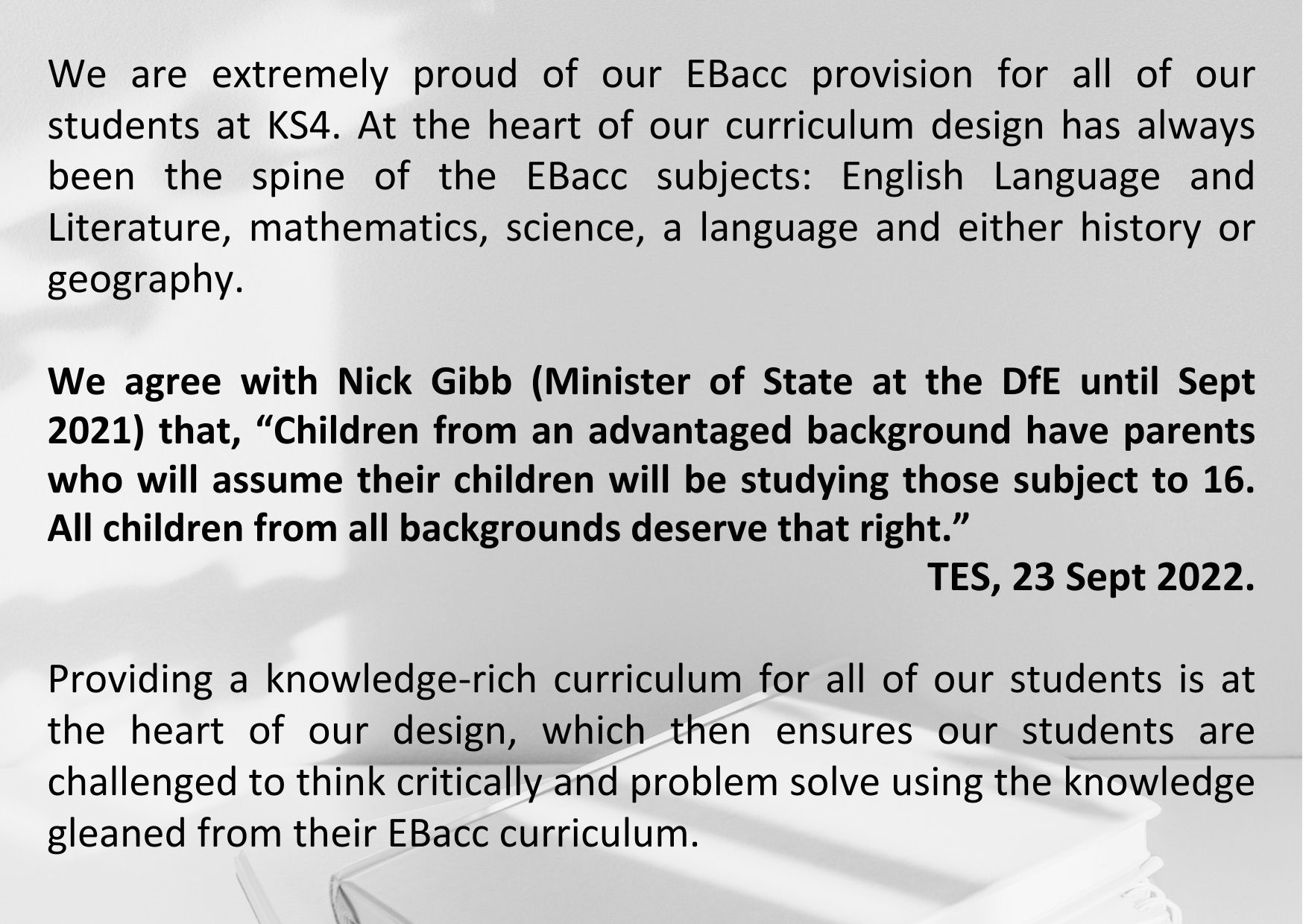Curriculum
Philosophy, Vision and Intent
“What do our students need to know and do in order to become educated and what sort of knowledge do our students need in order to thrive and shape the world?”


The Enhanced Curriculum

EBacc

When EBacc subjects are combined with creative, practical and vocational subjects as GCSE options for all students, we know we are providing knowledge of the modern world and an enjoyment of culture for all in order to support our students to succeed in life outside of our ECSfG community. Over 96% of our Y11s achieve the EBacc, year on year – well above the DfE national expectation of 75% of all students by Sept 2022 and 90% by 2025.
Key knowledge
At ECSfG, strong discipline means all students are taught in a safe and caring environment, with high expectations and where success and achievement are regularly rewarded and more importantly, celebrated by all.
Our curriculum has been carefully mapped throughout the Key Stages so that our students gain mastery and rich knowledge sequences in their long-term memories.
In all our subjects, precisely identified ‘end points’ for each unit of learning help to embed this deep learning. It is vital that our curriculum gives every student the knowledge they are entitled to as part of their cultural inheritance, as our focus on ‘closing the gap’ continues year on year.
Curriculum Breadth and Balance
The cultural inheritance mentioned above, along with student experiences of our enrichment programme is a key principle in our curriculum design in order to ensure our students have the opportunities of attending a wide range of clubs, intervention sessions, visits of cultural focus and University experiences.
Our students therefore enjoy their learning and can understand how their experiences of all subjects are intertwined in order to have a full understanding of how science, culture and the arts provide this rich cultural experience.
Assignments and Study: MS teams
Our Curriculum Leaders have identified what the key or larger concepts are in each subject and how they then need to break them down into smaller component parts so that learning is manageable, exciting and successful for all students. These parts are then sequenced correctly so that students gradually build their knowledge and understanding over the Key Stage of those larger concepts. Constant frequent retrieval of prior knowledge takes place in every lesson – why this, why now; why this last lesson; why this last week, last unit, last year etc. in order to aid the students’ learning to become embedded into their long term memory.
In every lesson, we strive to include a starter task that reviews prior learnt key knowledge; knowledge checkpoints throughout the lesson; plenaries to gauge understanding. We know that teaching & learning inside the classroom, with our expert teachers, is the best way to provide our outstanding curriculum. However, we do not underestimate the vital role that home learning and work outside the classroom plays in our students’ journey of learning.
The traditional concept of ‘homework’ is known by staff and students as ‘assignments’ as we have embraced MS Teams as a core platform in aiding the success of our students.
All subjects identify at least one key piece of formative assessment per unit of work across all key stages which we identify as a ‘Core Task’. One core task is completed every half-term in order to monitor progress and provide reparative feedback and improvement methods. Core tasks are:
-
Variable in nature and format (retrieval tests, assignment grids, experiments, performances, pieces of written work, presentation to the class, etc)
-
Set by each subject midway through a unit of work to allow action feedback to be implemented by the student and as a knowledge and understanding checkpoint by the teacher
-
Marked in students’ exercise books, workbooks or folders using WWW, EBI – alternatively, they can be set and marked via MS Teams.
We pride ourselves on the collaborative work undertaken by teachers focusing on Effective Questioning in lessons. Excellent questioning leads the student on a journey through the curriculum in which there is a balance struck between content (who, what, when) and process (how, why). Asking well-structured, thought-out questions has a number of positive benefits within the classroom, including:
-
Directing students’ thinking in a deliberate way
-
Encouraging students to think and actively construct their own schemas
-
Structuring or guiding the learning of a task
-
Allowing teachers to assess the learning of their students both in terms of what they bring to the lesson (prior knowledge) and what they are taking from the lesson (newly learnt, rich knowledge)
-
Identifying gaps and/or misconceptions in students’ learning
-
Helping students clarify their understanding of a topic/ unit.
Sequence Learning
 We believe that ‘spiralling knowledge’ is fundamental to designing a high-quality curriculum – how each subject and unit has been sequenced, connected, designed and constructed is at the heart of our Curriculum Leaders’ planning time and collaboration, whole school.
We believe that ‘spiralling knowledge’ is fundamental to designing a high-quality curriculum – how each subject and unit has been sequenced, connected, designed and constructed is at the heart of our Curriculum Leaders’ planning time and collaboration, whole school.
We believe that the key to ensuring that what our students learn builds on what they have learned before – the detailed process of inclusive curriculum sequencing and mapping out the skills (procedural knowledge) and knowledge (declarative knowledge) and content is therefore vital to ensuring success for all our students.
Support and Challenge
 At ECSfG, we adhere to the mantra “What works and is good for our SEND students, is good for all our students”. Using research from Marc Rowland’s “Addressing Educational Disadvantage in Schools and Colleges” 2021, we have instilled the core principle that first and foremost, all students need exposure to our outstanding expert teachers in the classroom. Having mixed ability groupings for the vast majority of our lessons reinforces this approach, ensuring that all students are supported to learn. Of course, we provide additional structures, small study skills groups and individual support outside of the classroom; but predominantly, we believe in inclusive teaching & learning for all.
At ECSfG, we adhere to the mantra “What works and is good for our SEND students, is good for all our students”. Using research from Marc Rowland’s “Addressing Educational Disadvantage in Schools and Colleges” 2021, we have instilled the core principle that first and foremost, all students need exposure to our outstanding expert teachers in the classroom. Having mixed ability groupings for the vast majority of our lessons reinforces this approach, ensuring that all students are supported to learn. Of course, we provide additional structures, small study skills groups and individual support outside of the classroom; but predominantly, we believe in inclusive teaching & learning for all.
Supporting Students with SEND
We encourage all students to have access to the full curriculum across the key stages. We have a dedicated team of support teachers and teaching assistants who work closely alongside curriculum leaders and teachers to ensure that all students feel confident and supported in all lessons.
We identify those who need literacy support as early as possible in Key Stage 3 and, depending on individual need, run a varied programme of:
-
in-class support
-
small-group reading and comprehension support
-
one-to-one literacy support
-
Lexia form-time support
We have an intensive Maths tutoring provision across Key Stage 3 and 4, where students in need of support are identified early and given targeted small group support.
Key Stage 4 students are given an additional GCSE pathway option where they follow an ASDAN personal development programme and study support option alongside more traditional GCSE and Btec option choices.
Students with Special Educational Needs and/or Disabilities are encouraged to participate fully in our extra-curricular clubs and enrichment programme across the curriculum, with particular focus placed on Gardening club, craft clubs such as Crochet club and music clubs. We supplement these with a range of SEND support clubs at break and lunch times.
For more information about our Curriculum, please contact Ms J Foster, Deputy Headteacher on 020 8363 3030.



